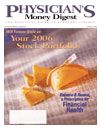Prevent Your Practice from Going Bankrupt
Physician's
Money Digest
The results of a reader surveyrevealed that about 2of 3 doctors expect theirmedical practice revenuewill decline or remain the same over thenext 3 years. In addition, 90% say theability to grow practice revenue is"much more or more challenging"compared with 5 years ago.
Those stark revelations, taken bythemselves, are reason enough for concern.When added to the growingnumber of bankruptcies in this country—approximately 1.3 million everyyear—and the fact that some 13% ofpersonal bankruptcies are actuallysmall-business bankruptcies in disguise,it signals a very disconcertingtrend. Unfortunately, it's a trend physiciansare not immune from. Physiciansare trained in the practice of medicine,not business. But while they don't necessarilyneed to become CPAs, they doneed to keep a closer watch on theirpractice's bottom line.
Early Warning Signs
Physicians
Practice
According to an article in , many medical practices gobankrupt because of failed relationshipswith other companies, especiallymajor insurance carriers and practicemanagement groups. For example,when Pennsylvania's Allegheny Health,Education, and Research Foundationfolded a few years ago, doctors affiliatedwith the system learned quite latethat their rents had not been paid inmonths, and they might never be paidthe money Allegheny owed them.Many walked away from Alleghenyand attempted to start new practices.But the financial reliance on the systemleft them feeling as though they themselveshad gone bankrupt, with a longuphill challenge ahead.
Experts agree that the best way forphysicians to protect themselves is tobe in close touch with the business endof their practice. Judith Mackarey, aprincipal in the Philadelphia law firmof Mackarey & Davidson, suggestskeeping close tabs on how insurancecarriers are doing financially. If aninsurer is not paying you on time, ornot paying you the full amount you areowed, that's the time to terminate youragreement, before it's too late.
Don't Make It Personal
Wall Street Journal
When cash flows dry up, there's atendency to whip out the credit card ortake cash advances as a temporary fix.Researchers say that the two types ofcredit card use most likely to contributeto a personal or business bankruptcyare cash advances and the useof the card as a substitute for salary.The problem is that credit cards aretoo easy to use. Rather than helpingyou get back on your feet, they createa revolving door of debt that is difficultto exit. For example, according to areport, high interestrates charged by credit card companiescan easily outstrip any possiblebusiness growth. If you are borrowingmoney at 18% or 19%, it's difficult toturn a profit.
Physicians Practice
Personal bankruptcy, according tothe article, canhave a direct and devastating impacton a doctor's practice. If a practice isincorporated, its assets may be protectedin a personal bankruptcy.Unfortunately, most practices are notincorporated, and the high incomereceived by most physicians can makeit difficult to declare personal bankruptcy.A big mistake that many peoplemake is putting up personal property,such as their homes, as collateralfor business loans. Then, even if thepractice is incorporated, any protectionthe business might have had iserased. If the practice goes under andthe loan is called, you could lose yourhome as well.
Don't Wait to Get Help
Physicians Practice
Experts agree that whether yourfinancial problems are business or personalin nature, don't wait until the lastminute to seek help. Commenting inthe article, BonnieWeir, an attorney and senior counselwith the law firm of Kern AugustineConroy & Schoppmann, suggests thatas soon as you find yourself in toodeep, contact your attorney immediatelyand begin looking for a way out.
Don't delay:
The longer you wait,the more difficult it will be to negotiatewith creditors. Acting early will alsogive you greater flexibility with yourbank. If your practice is having cashflow problems, consider skipping apaycheck, or taking a cut in pay, tohelp build cash reserves. Use credit as atool by arranging for a short-term loanor line of credit with your bank untilcash flow improves.
Building practice revenue might bemore difficult today than in past years,but that doesn't mean you have to takea severe step backward. Stay in touchwith the business end of your practice,and keep your eyes focused on thatbottom line.
